MercoPress. South Atlantic News Agency
Tag: Javier Milei
-
Wednesday, February 28th 2024 - 10:59 UTC
Argentina: Feud with Patagonian provinces not settled despite judiciary ruling
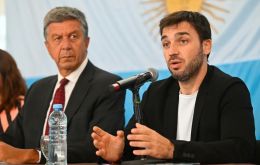
A Federal Judge in Rawson ruled Tuesday that the national government of Argentine President Javier Milei should have not withheld the so-called co-participation funds owed to the province of Chubut. Nevertheless, Buenos Aires will reportedly take the case to the federal Supreme Court. Hence, the matter is far from settled.
-
Tuesday, February 27th 2024 - 10:35 UTC
Satellite internet providers allowed to operate in Argentina

Argentine authorities approved in a resolution published Monday in the Official Gazette that companies such as Amazon Kuiper, OneWeb, and Elon Musk's Starlink may start providing satellite internet connectivity to local users, it was reported in Buenos Aires. The service will become available in the second quarter of 2024.
-
Monday, February 26th 2024 - 11:44 UTC
Patagonian governors threaten to cut oil and gas output

The Governors of Argentina's Patagonian provinces said Sunday that they would cut oil and gas output starting Wednesday if Chubut's funds are not wired by then from the federal administration of President Javier Milei. The announcement was made after Governors Ignacio Torres (Chubut), Gustavo Melella (Tierra del Fuego), Sergio Ziliotto (La Pampa), Claudio Vidal (Santa Cruz), Rolando Figueroa (Neuquén), and Alberto Weretilneck (Río Negro) convened to join forces.
-
Monday, February 26th 2024 - 10:54 UTC
Trump tells Milei to “Make Argentina Great Again”
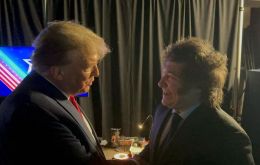
Despite previous announcements that their schedules would not match, Argentine President Javier Milei Saturday managed to have a brief encounter with former US head of state Donald Trump on the sides of the Conservative Political Action Conference (CPAC) in Maryland.
-
Saturday, February 24th 2024 - 10:24 UTC
Argentina: Chubut Governor threatens to cut oil supply if federal funds are withheld

Chubut Governor Ignacio Torres Friday warned Argentine President Javier Milei that his province would stop exporting oil if the federal administration insisted on “improperly withholding half of the [so-called] co-participation” funding. “If on Tuesday there is no resolution from the courts, we will not export even one more barrel of oil,” threatened Torres, whose stance was endorsed by several fellow governors and also by Buenos Aires Mayor Jorge Macri.
-
Saturday, February 24th 2024 - 09:09 UTC
Blinken meets with Milei at Casa Rosada
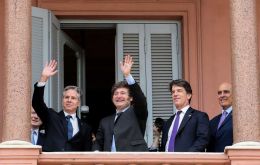
US Secretary of State Antony Blinken Friday conveyed to Argentine President Javier Milei the support of the Joseph Biden administration to the South American country's economic plan. Blinken described his meeting of nearly two hours as “incredibly positive” and highlighted Argentina's “extraordinary potential,” it was reported from Buenos Aires.
-
Friday, February 23rd 2024 - 10:19 UTC
Milei and IMF envoy discuss additional help for Argentina
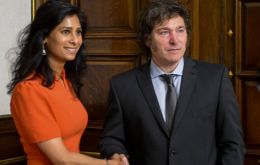
President Javier Milei and International Monetary Fund (IMF) Deputy Managing Director Gita Gopinath Thursday discussed Argentina's course of action under the Libertarian's leadership during a meeting at Casa Rosada, it was reported from Buenos Aires. Gopinath said she had an “excellent and substantive meeting with President Milei on the best way to move the country forward.” Also Thursday, she got together with Cabinet Chief Nicolás Posse and Interior Minister Guillermo Francos.
-
Friday, February 23rd 2024 - 10:10 UTC
Milei closing federal agency against discrimination and racism

Argentine President Javier Milei's administration Thursday announced it would dissolve the National Institute against Discrimination, Xenophobia, and Racism (Inadi) in a move to cut public spending, it was reported in Buenos Aires. In making his decision, Milei argued that the Inadi, which includes some 400 workers and had dozens of delegations nationwide, was the “Thought Police” of Kirchnerism.
-
Wednesday, February 21st 2024 - 16:12 UTC
French FM stops by in Buenos Aires ahead of Rio summit
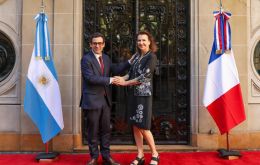
Argentine President Javier Milei met in Buenos Aires Tuesday with France's Foreign Minister Stéphane Séjourné to strengthen bilateral ties and trade between the two countries.
-
Wednesday, February 21st 2024 - 16:04 UTC
Milei's spokesperson: “Cameron's Malvinas visit, an issue of Cameron agenda”
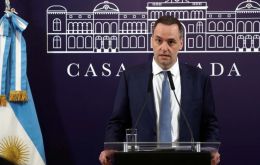
Indifference and irony have been reactions of the current Argentine government to the Falkland Islands visit of British foreign minister, Lord Cameron. Indifference if we follow the statements from president Milei's spokesperson, who every day holds a morning media conference to report and take questions on the activities and performance of current administration obsessed with seeking the much promised recovery of Argentina's economic situation.
